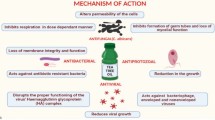Abstract
Data sources
PubMed, the Cochrane Library and Web of Science databases.
Study selection
Randomised controlled trials (RCTs) providing information on the effectiveness of oral sprays on plaque or gingival inflammation and published in English were considered.
Data extraction and synthesis
Two reviewers independently screened the studies, abstracted data and assessed risk of bias using the Cochrane tool. Disagreements were resolved by discussion and consensus. Estimates from suitable studies were pooled using a random effects meta-analysis.
Results
Twenty trials involving a total of 720 patients were included. The majority of the studies (14) used chlorhexidine (0.12 or 0.2%). The other six studies used Hyaluronic acid (HA); 0.2% hexetidine; 0.2% stannous fluoride; triclosan (TRN); cetylpyridinium chloride (CPC); and benzydamine hydrochloride (B-HCl). Ten studies involved physically or mentally challenged patients, six trials involved healthy adults. Significant reductions in dental plaque ranging from 22% to 78% were reported in 14 studies with 11 studies reporting significant improvement in gingival health with 13% to 75% reductions in Gingival Index (GI) scores. Meta-analysis (three studies) of 0.2% chlorhexidine (CHX) spray intervention, without prophylaxis at baseline, showed reductions in Plaque Index (PI) = 0.74 (95%CI: -1.03 to -0.45) and Gingival Index (GI) = 0.22 (95% CI: -0.38 to -0.06). Five studies provided a prophylaxis before study initiation, three used 0.2% CHX spray. Meta-analysis demonstrated an increase of 0.18 (95% CI: -0.01 to 0.37) in PI scores. Two RCTs compared 0.12% and 0.2% CHX spray, and a meta-analysis showed increases of 1.71 (95% CI: 1.27 to 2.14) and 1.58 (95% CI: 1.23 to 1.93), respectively, in PI scores.
Conclusions
The authors concluded that the available evidence suggests that oral sprays are an acceptable delivery method for antiseptic agents. CHX is the most widely investigated antiseptic agent used in oral sprays, and meta-analyses suggested it to be effective in reducing plaque scores and gingival inflammation. However, considering that bias to some extent existed in the included studies, the findings in this review should be interpreted with caution
Similar content being viewed by others
Commentary
Effective toothbrushing at least twice a day using a fluoridated toothpaste is an essential component of any oral health regime. However, there are times when this is not always possible, for example following surgery or in patients with additional needs. For these patients assisted toothbrushing and the use of chemotherapeutic agents may be helpful. Mouthrinses are one method of delivering these agents although oral sprays are a potential alternative. The aim of this review was to assess the efficacy of antiseptic oral sprays for the control of plaque and gingivitis.
The literature search of this review involved three major databases, although restricting the included studies to those published in English might have excluded some studies, a point noted by the authors. Twenty RCTs were included although seven of them involved fewer than 20 patients. The studies were also of short duration with only two of them being longer than two months. A range of chemotherapeutic agents were employed although chlorhexidine was the most commonly used, however even with this agent there was considerable variation in the treatment protocols used between the studies. The authors assessed study quality using the Cochrane risk of bias tool although only the overall summary is presented in the published article rather than individual study data. In the discussion the authors highlight that a large majority of studies did not report on randomisation allocation concealment blinding or sample size calculation which raises questions about the overall quality of the included studies.
While meta-analysis suggests that small reductions can be demonstrated in the short-term studies the clinical relevance of these findings is uncertain. Further well designed, conducted and reported studies of the appropriate size and duration are needed to clarify the real clinical effectiveness of these agents.
Author information
Authors and Affiliations
Additional information
Address for correspondence: Otto LT Lam, 3B-13, Faculty of Dentistry, Pokfulam Road, The University of Hong Kong, Hong Kong, China. E-mail: ottolam@hku.hk
Zhang J, Ab Malik N, McGrath C, Lam O. The effect of antiseptic oral sprays on dental plaque and gingival inflammation: A systematic review and meta-analysis. Int J Dent Hyg 2018; doi: 10.1111/idh.12331. [Epub ahead of print] Review. PubMed PMID: 29405627.
Rights and permissions
About this article
Cite this article
Richards, D. Limited evidence for the effectiveness of antiseptic sprays for control of plaque and gingival inflammation. Evid Based Dent 19, 75 (2018). https://doi.org/10.1038/sj.ebd.6401322
Published:
Issue Date:
DOI: https://doi.org/10.1038/sj.ebd.6401322



